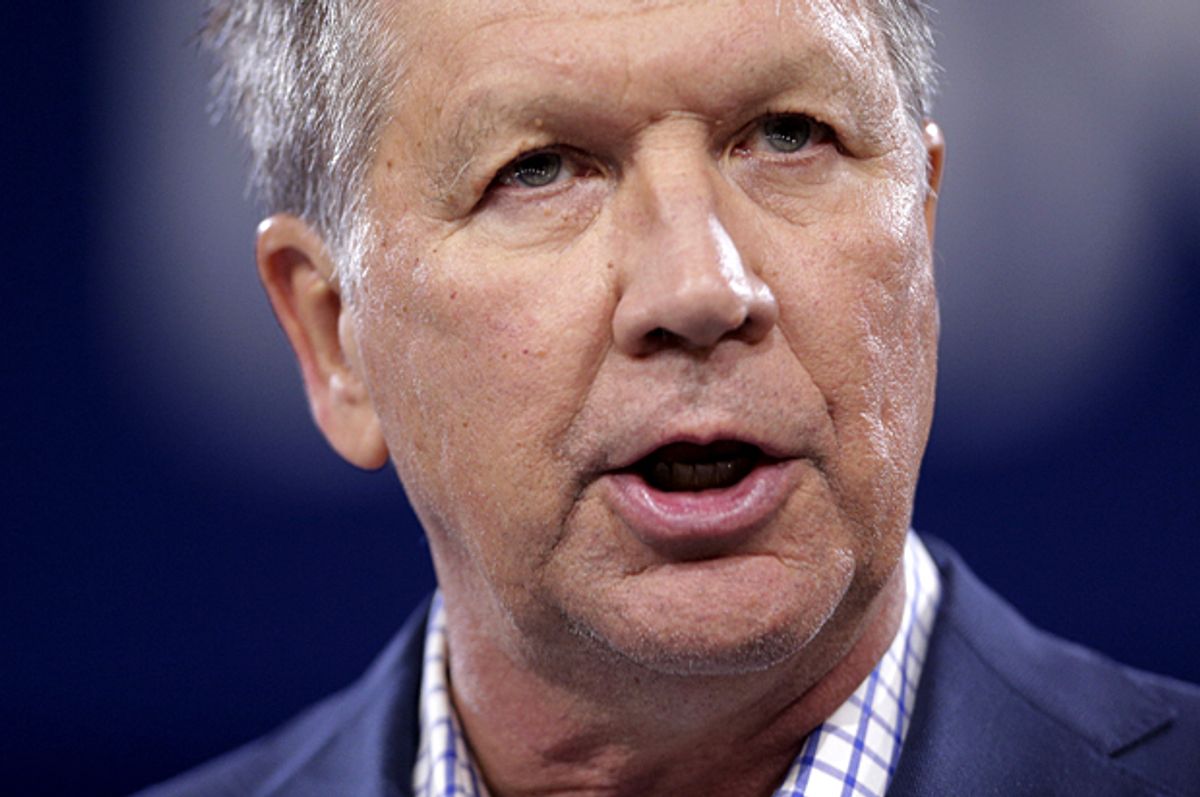John Kasich's reputation as the "normal" Republican comes, in large part, from a lack of serious media scrutiny. But over the weekend, one intrepid reporter, Allie Morris of the Concord Monitor, captured a telling Kasich moment as the Ohio governor stumped for Chris Sununu, a Republican running for governor of New Hampshire.
"Inside a bookstore he didn’t much discuss Sununu’s candidacy," Morris wrote. "Instead he looked at the latest Harry Potter book and pondered why British actor Daniel Radcliffe is an atheist."
Morris continued:
“You know that Daniel Radcliffe has declared himself an atheist?” Kasich said to no one in particular. “I’m serious. What a weird thing. Why would a guy who has had all that success just, I mean, what the hell is wrong with him?”
It is true that Radcliffe gave an interview in 2009, at age 19, when he said, "I'm an atheist, but I'm very relaxed about it. I don't preach my atheism, but I have a huge amount of respect for people like Richard Dawkins who do."
Further research revealed that Radcliffe was not kidding about the "relaxed" part, as he has hardly ever spoken publicly about his unbelief in a deity. So why was Kasich moved to bellyache about it, particularly when the provocation appeared to be little more than glimpsing the cover of a Harry Potter book?
Contacting Kasich's press office did not clear up the mystery. "He was expressing surprise that someone who has seen so much success would announce they were an atheist," his aide Chris Schrimpf told Salon. He did not reply to follow-up questions about why anyone would think there's a conflict between professional success and overt atheism.
"If I'm being charitable, I could pretend that John Kasich is referring to the stigma associated with being an atheist, which certainly still exists in American society, even among such unlikely groups as the wider LGBTQ community," Heina Dadabhoy, a prominent atheist blogger and activist, told me by email.
But she felt it was likelier that Kasich was puzzled that his god would bestow success on an atheist Brit like Radcliffe.
"Why Kasich's god of choice would bestow blessings upon a nonbeliever is beyond me, but as a never-Christian atheist, what do I know?" she said.
Jokes aside, it is clear that Kasich's comments are rooted in the widespread belief that something is wrong — or "weird" — when a person doesn't believe in God. To the atheists I spoke with, this belief is completely out of touch with reality.
"As the number of religiously unaffiliated Americans who live full, ethical lives without a god continues to grow, I expect that comments like Kasich's will begin to seem more weird than atheism," said Roy Speckhardt, executive director of the American Humanist Association. "What's wrong is that a majority of our nation's leaders rely more on faith instead of science and reason when it comes to determining the best course for America."
The number of people who have no religion is exploding. Nearly 40 percent of the people in Wales and England, where Radcliffe hails from, told pollsters in a 2011 poll that they have no religion. In the United States, nearly a quarter of all Americans surveyed in a 2014 Pew Research Center poll said they have no religion, a rise from 16 percent in 2007.
Nearly half of the irreligious indicate that they left religion because they lost their faith, and the rest cite a distaste for organized religion, indifference or uncertainty about church teachings, according to Pew. Seven percent openly identify as atheist or agnostic.
"It's sad to see the governor of Ohio openly express this kind of ignorance and religious bigotry," Greta Christina, who is the author of "The Way of the Heathen: Practicing Atheism in Everyday Life" and a board member for the Foundation Beyond Belief, told me.
"We are your neighbors, your co-workers, your friends, your family," she added. "We care about being good people and making the world better. There is nothing wrong with us simply because we don't believe in God. If you wouldn't express shock and dismay at someone being Jewish, Catholic or Buddhist, you shouldn't do it with atheists."
Matt Dillahunty, the host of "Atheist Experience Live," was even more blunt in his assessment.
"I'd like to thank him for clearly demonstrating why, in 2016, atheists are still concerned about how we are publicly maligned and whether we're likely to be fairly represented by our elected officials," he said of Kasich. "It's disgraceful. And it's not atheists that have something wrong with them," he added. "It's politicians who feel free to openly parade the bigotry that should disqualify them from office."
That is what makes the story such a strange one. Kasich's remarks were unprompted and unprovoked. It was a drive-by atheist bashing, motivated by little more than a book cover, suggesting that irrational bigotry toward a huge chunk of his constituency just bubbles up out from this supposedly moderate Republican with the slightest of nudges.
That's one of the many reasons that the Republican Party has problems that run much deeper than the Great Orange Blowhard. This kind of casual bigotry and ignorance about the lives of huge numbers of people runs deep in the GOP, and is encoded in its conservative DNA. One can forgive ordinary Americans who may be ignorant because they don't know any atheists (or think they don't, anyway), people who want to be leaders in a democracy owe it to the citizens to be better educated than that. They are supposed to serve all of us, not just the believers.



Shares